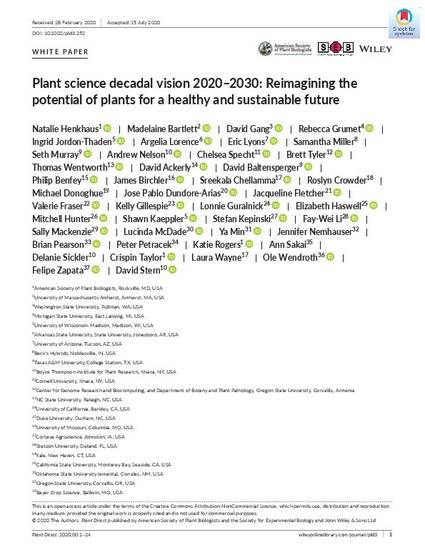
Plants, and the biological systems around them, are key to the future health of the planet and its inhabitants. The Plant Science Decadal Vision 2020–2030 frames our ability to perform vital and far‐reaching research in plant systems sciences, essential to how we value participants and apply emerging technologies. We outline a comprehensive vision for addressing some of our most pressing global problems through discovery, practical applications, and education. The Decadal Vision was developed by the participants at the Plant Summit 2019, a community event organized by the Plant Science Research Network. The Decadal Vision describes a holistic vision for the next decade of plant science that blends recommendations for research, people, and technology. Going beyond discoveries and applications, we, the plant science community, must implement bold, innovative changes to research cultures and training paradigms in this era of automation, virtualization, and the looming shadow of climate change. Our vision and hopes for the next decade are encapsulated in the phrase reimagining the potential of plants for a healthy and sustainable future. The Decadal Vision recognizes the vital intersection of human and scientific elements and demands an integrated implementation of strategies for research (Goals 1–4), people (Goals 5 and 6), and technology (Goals 7 and 8). This report is intended to help inspire and guide the research community, scientific societies, federal funding agencies, private philanthropies, corporations, educators, entrepreneurs, and early career researchers over the next 10 years. The research encompass experimental and computational approaches to understanding and predicting ecosystem behavior; novel production systems for food, feed, and fiber with greater crop diversity, efficiency, productivity, and resilience that improve ecosystem health; approaches to realize the potential for advances in nutrition, discovery and engineering of plant‐based medicines, and "green infrastructure." Launching the Transparent Plant will use experimental and computational approaches to break down the phytobiome into a "parts store" that supports tinkering and supports query, prediction, and rapid‐response problem solving. Equity, diversity, and inclusion are indispensable cornerstones of realizing our vision. We make recommendations around funding and systems that support customized professional development. Plant systems are frequently taken for granted therefore we make recommendations to improve plant awareness and community science programs to increase understanding of scientific research. We prioritize emerging technologies, focusing on non‐invasive imaging, sensors, and plug‐and‐play portable lab technologies, coupled with enabling computational advances. Plant systems science will benefit from data management and future advances in automation, machine learning, natural language processing, and artificial intelligence‐assisted data integration, pattern identification, and decision making. Implementation of this vision will transform plant systems science and ripple outwards through society and across the globe. Beyond deepening our biological understanding, we envision entirely new applications. We further anticipate a wave of diversification of plant systems practitioners while stimulating community engagement, underpinning increasing entrepreneurship. This surge of engagement and knowledge will help satisfy and stoke people's natural curiosity about the future, and their desire to prepare for it, as they seek fuller information about food, health, climate and ecological systems.
Available at: http://works.bepress.com/jp-dundore-arias/1/

© 2020 The Authors. This is an open access article under the terms of the Creative Commons Attribution‐NonCommercial License, which permits use, distribution and reproduction in any medium, provided the original work is properly cited and is not used for commercial purposes.
Published in Plant Direct by American Society of Plant Biologists and the Society for Experimental Biology and John Wiley & Sons Ltd. Available via doi: 10.1002/pld3.252.